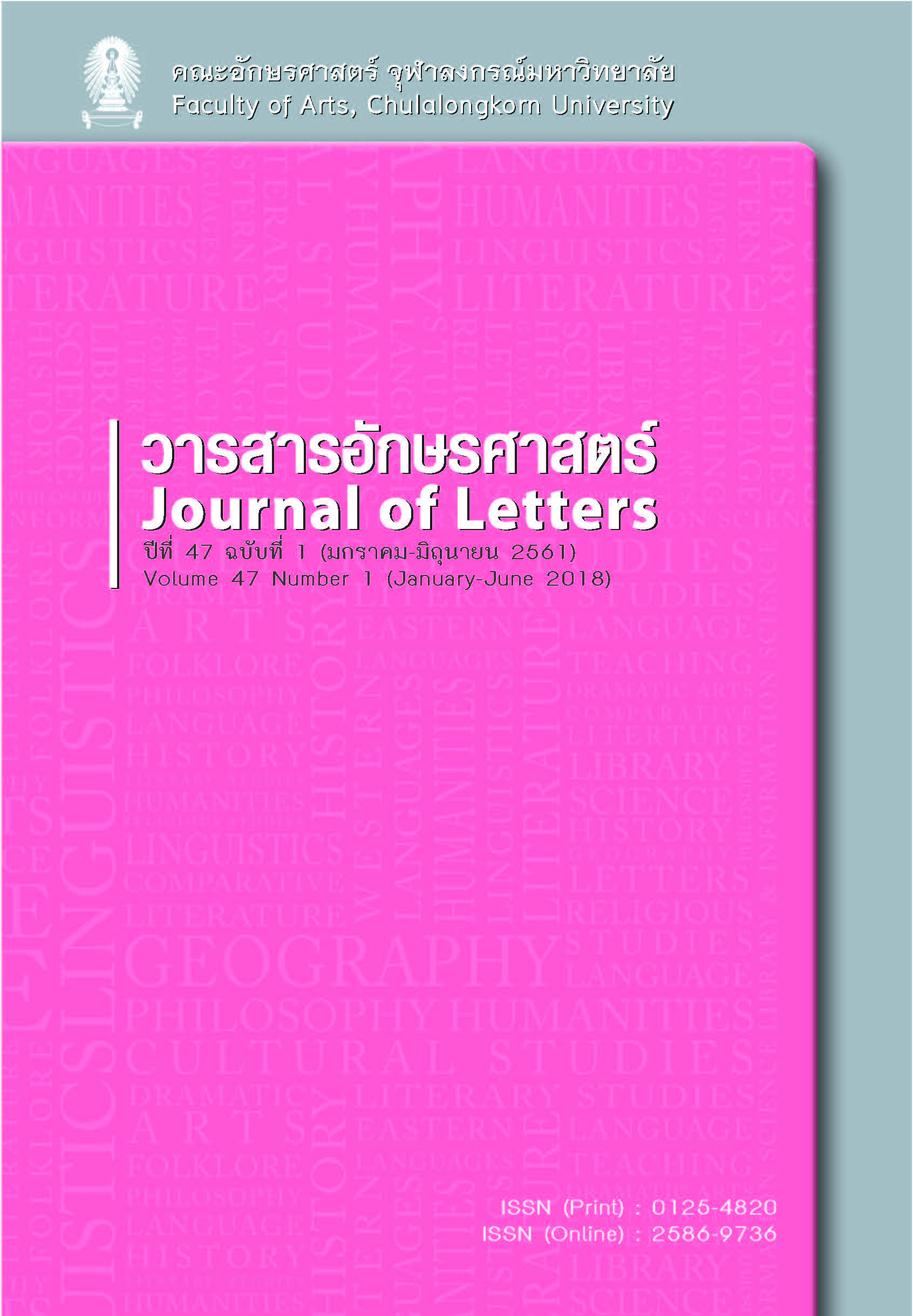Remarks on the uses of question words in current Thai
Keywords:
question words, functions, indirect speech acts, discourse markers, grammaticalizationAbstract
The paper aims to propose the remarks on the uses of question words in Thai in the current time. Not only do they function as a request for information from the addressees, they are also used to indicate other intentions of the speakers, which are considered pragmatically as indirect speech acts. They are also used to perform other functions besides those found in the previous studies, which are to ensure that the addressees are with the speakers, to mock the addressees, to mean ‘very much’, to give an opinion and to show the ignorance for addressees’ utterances. The paper, moreover, proposes the remark that in some context whereby the question word ‘ปะ’ /pàɁ/, the allophone of the question word ‘หรือเปล่า’ /rʉ̌ːplàːw/ and the question word ‘มะ’ /máɁ/, the allophone of the question word ‘ไหม’ /mǎj/ can substitute each other. Lastly, it shows that the question words ‘ปะ’ /pàɁ/ and ‘มะ’ /máɁ/ are used as discourse markers to indicate an assertion of the information of the speaker. This may reveal the grammaticalization of those two words from the question words to discourse markers.
References
Amara Prasithrathsint อมรา ประสิทธิ์รัฐสินธุ์. 2013. Phasasart Sangkhom ภาษาศาสตร์สังคม [Sociolinguistics]. Bangkok: Chulalongkorn University Press.
Chitraporn Kiatipaibool จิตราภรณ์ เกียรติไพบูลย์. 1982. “Khamtham bap toprap-patiset nay phasa thai: Karn wikroh choeng atthasart” คำถามแบบตอบรับ-ปฏิเสธในภาษาไทย: การวิเคราะห์เชิงอรรถศาสตร์ [Yes-No Questions in Thai: A Semantic Analysis]. Master Thesis, Chulalongkorn University.
Deeyu Srinarawat ดียู ศรีนราวัฒน์. 2011. Kolwithee suesarn duay kanphut aom khong khon Thai กลวิธีสื่อสารด้วยการพูดอ้อมของคนไทย [Indirectness as a communicative strategy of Thai speakers]. Warasarn Phasa Lae Phasasart วารสารภาษาและภาษาศาสตร์ [Journal of Liberal Arts] 17: 26-39.
Kamchai Thonglor กำชัย ทองหล่อ. 2011. Lak Phasa Thai หลักภาษาไทย [Grammar of the Thai Language]. Bangkok: Ruamsarn.
Kingkarn Thepkanjana กิ่งกาญจน์ เทพกาญจนา. 2016. Krabuankarn Klay Pen Roop Waiyakorn กระบวนการกลายเป็นรูปไวยากรณ์ [Grammaticalization]. Research and Publication division, Faculty of Arts, Chulalongkorn University.
Nawawan Phanthumetha นววรรณ พันธุเมธา. 2015. Waiyakorn Thai ไวยากรณ์ไทย [Thai Grammar]. Bangkok: Research and Publication division, Faculty of Arts, Chulalongkorn University.
Peansiri Wongwipanon เพียรศิริ วงศ์วิภานนท์. 1988. Khwammay ความหมาย [Meaning]. In Ekkasarn Karnsorn Chutwicha Phasa Thai 3 เอกสารการสอนชุดวิชา ภาษาไทย 3 [Teaching document in Thai 3], Faculty of Education, Sukhothai Thammathirat Open University, 348-355. Bangkok: Sukhothai Thammathirat Open University Press.
Pranee Kullavanijaya ปราณี กุลละวณิชย์. 1980. Phuphut kap prayok khamtham bap toprap-patiset ผู้พูดกับประโยคคำถามแบบตอบรับ-ปฏิเสธ [Speakers and yes-no questions]. Warasarn Aksornsart วารสารอักษรศาสตร์ [Journal of Letters] 12: 46-53.
Royal Institute ราชบัณฑิตยสถาน. 2013. Photjananukrom Chabup Ratchabundittayasathan Phuttasakkarat 2011 พจนานุกรม
ฉบับราชบัณฑิตยสถาน พ.ศ. 2554 [The Royal Institute Dictionary 2011]. Bangkok: Nanmee Books Publications.
Siriluck Hoonsringam สิริลักษณ์ หุ่นศรีงาม. 2001. “Karnsuksa prayok phasa thai tii mee kham wa thammay thang dan attasart lae watchanapattibatsart” การศึกษาประโยคภาษาไทยที่มีคำว่า ทำไม ทางด้านอรรถศาสตร์และวัจนปฏิบัติศาสตร์ [A Semantic and Pragmatic Study of Thai Sentences with 'thammay']. Master Thesis, Chulalongkorn University.
Udom Warotamasikkadit อุดม วโรตม์สิกขดิตถ์. 2004. Waiyakorn Thai Nay Phasasart ไวยากรณ์ไทยในภาษาศาสตร์ [Thai Grammar in Linguistics]. Bangkok: Ramkhamhaeng University Press.
Upakit Silpasan, Phraya อุปกิตศิลปสาร, พระยา. 2002. Lak Phasa Thai หลักภาษาไทย [Grammar of the Thai Language]. Bangkok: Thai Wattana Panit.
Vichin Panupong วิจินตน์ ภาณุพงศ์. 1993. Krongsang Khong Phasa Thai: Rabop Waiyakorn โครงสร้างของภาษาไทย: ระบบไวยากรณ์ [The Structure of Thai: Grammatical System]. Bangkok: Ramkhamhaeng University Press.
Watcharapon Booppanimit วัชรพล บุพนิมิตร. 1996. “Datchanee paritchet nay botsontana phasa thai” ดัชนีปริจเฉทในบทสนทนาภาษาไทย [Discourse Markers in Casual Conversations of Bangkok Thai]. Master Thesis, Chulalongkorn University.
Woraporn Daisakulchu วรพร ได้สกุลชู. 2004. “Karnchay prayok khamtham nay watchanakam aom” การใช้ประโยคคำถามในวัจนกรรมอ้อม [Questions in Indirect Speech Acts]. Master Thesis, Thammasat University.
ภาษาอังกฤษ
Schriffin, Deborah. 1987. Discourse Markers. New York: Cambridge University Press.
Searle, John. R. 1969. Speech Acts: An Essay in the Philosophy of Language. London: Cambridge University Press.
Downloads
Published
How to Cite
Issue
Section
License
Copyright and plagiarism
Authors are responsible for obtaining permission to use copyrighted materials from copyright owners. Authors are responsible for observing requisite copyright law when quoting or reproducing copyrighted materials. Quotations and reproductions of content from other published sources must be accompanied by a reference and all sources should be clearly listed in the references section. Quotations and reproductions of content from external sources without due attribution could be considered a severe infringement of academic conduct and may constitute a legal offence under the Copyright Act of B.E. 2537. Any legal ramifications arising from the infringement of copyright regulations would be the sole responsibility of the author(s).



